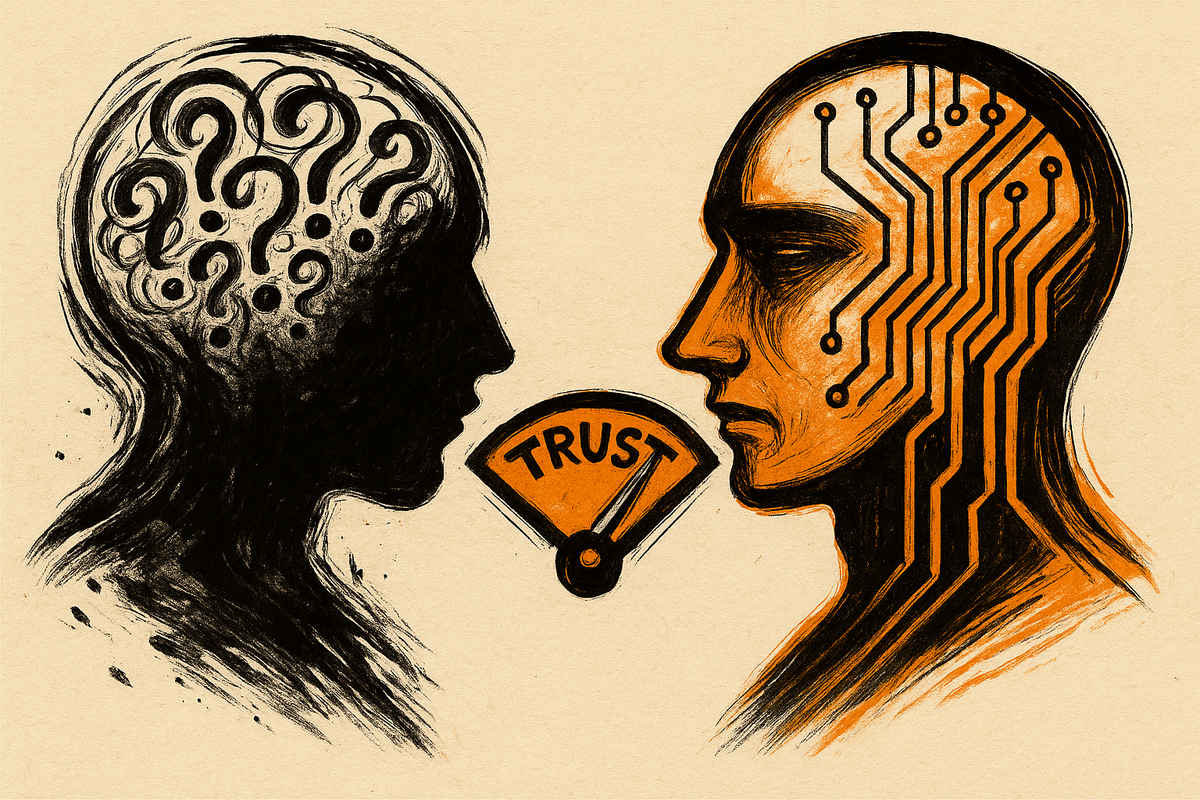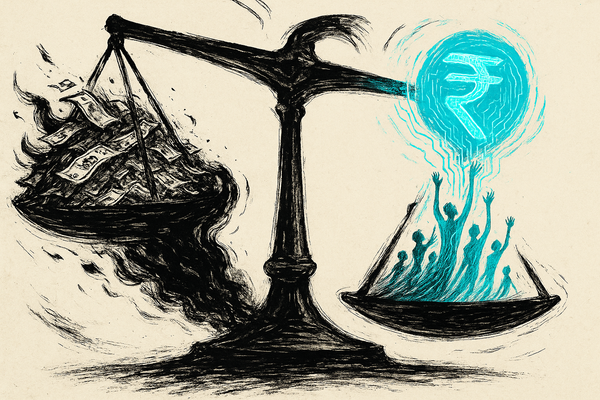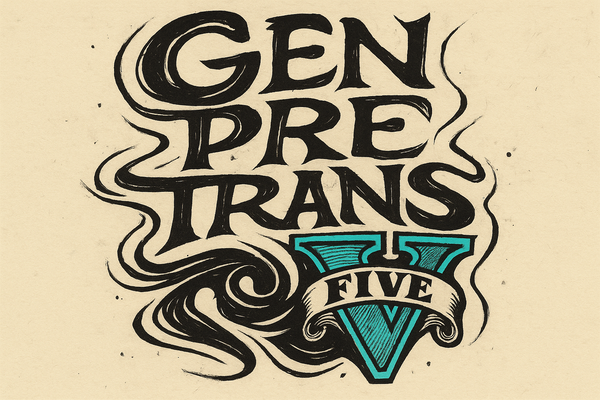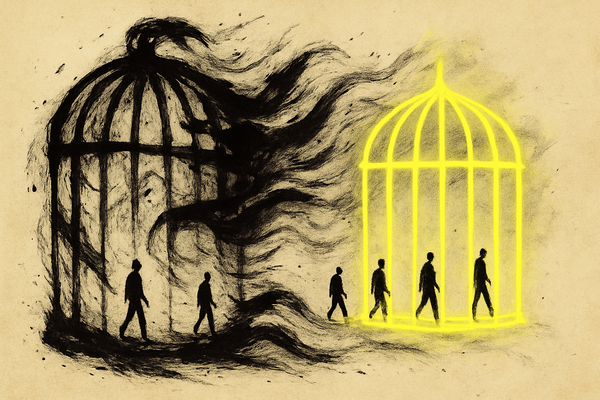ImaginEconomy Daily #9
When 71% of CMOs plan to spend millions on AI but 92% admit their teams can't use it, who wins? Spoiler: Not the CMOs.

ImaginEconomy 🧠 ✨ 💰 : Brands, Strategy, Story and Design in the Age of AI
Adobe's LLM Optimizer Launches the New SEO Arms Race
Adobe unveiled its LLM Optimizer at Cannes Lions, marking the shift from traditional SEO to AI-SEO as brands scramble for visibility in ChatGPT, Perplexity, and AI-powered browsers. The tool monitors AI-driven traffic in real-time, identifies content gaps, and provides one-click optimization recommendations. With AI-powered interfaces driving a 3,500% increase in traffic to U.S. retail sites since July 2024, visibility in large language models has become existential for brands.
ImaginEconomy Impact: Forget everything you knew about SEO. The new battlefield isn't Google's first page. It's whether AI mentions your brand when answering customer questions. If you're not optimized for AI discovery, you're invisible to the growing segment of consumers who skip Google search entirely. Smart agencies will start offering AI visibility audits yesterday. The winners will be those who understand that AI-SEO isn't about keywords. It's about becoming the authoritative source that AI systems trust and cite. Welcome to the age where your Wikipedia entry and Reddit mentions matter more than your homepage.
Source: Adobe announces LLM Optimizer
The $10M Skills Crisis: When Big Budgets Meet Empty Brains
Boston Consulting Group's annual CMO survey drops a bombshell: 71% of CMOs plan to invest over $10 million annually in GenAI over the next three years, up from 57% last year. Yet the same leaders report their teams lack the skills to effectively deploy these tools, creating a massive ROI gap. While one-third report improvements in customer experience and content quality, fewer cite the efficiency gains they expected.
ImaginEconomy Impact: This is corporate async at its finest: throwing money at AI while the team doesn't even know basic prompt engineering from active prompt engineering. The $10M skills gap represents the biggest opportunity in marketing since digital transformation. Agencies and brands that can bridge this chasm, through training, talent acquisition, or managed services, will thrive. But remember that the problem isn't really about skills. It's about mindset. CMOs buying Ferrari engines and installing them in horse carriages won't end well. The winners will be those who rebuild their entire mental model and operating system around AI, not just bolt it onto the existing chassis.
Source: BCG CMO Survey on GenAI Investment
Meta's 2026 Endgame: Upload Assets, Let AI Do Everything Else
Meta plans to fully automate advertising by late 2026, allowing brands to simply upload product images and budgets while AI handles everything else—from creative generation to targeting to optimization. The system will create entire campaigns including imagery, video, and text, determine optimal audiences, and even deliver real-time personalized ad variants based on user location and context. CEO Mark Zuckerberg calls this "a redefinition of the category of advertising."
ImaginEconomy Impact: Agencies, start writing your obituaries—or better yet, your resurrection stories. Meta's automation roadmap isn't just disrupting advertising; it's obliterating the traditional agency model. When AI can create, target, and optimize better than humans, what's left for agencies? Everything that matters: strategy, brand soul, cultural intelligence, and the messy human insights that AI can't replicate. The agencies that survive won't be those fighting automation but those who become Human-AI orchestrators.
Source: Meta's AI advertising automation plans
Trust Flips: AI Recommendations Now Beat Your Best Friend's Advice
Half of all consumers now trust AI to help make important decisions about their health, finances, and insurance, according to Smart Communications' 2025 Customer Experience Benchmark. More striking: hesitation about AI in customer communications plummeted from 77% to 37% year-over-year. Consumers increasingly value AI recommendations over peer advice, especially in complex decision-making scenarios.
ImaginEconomy Impact: The trust economy just experienced a seismic shift. When people trust algorithms over by friends and family for life advice, we've crossed the Rubicon. For brands, this creates both opportunity and responsibility. The opportunity: AI-powered personalization that actually converts because people believe it. The responsibility: Don't blow it. One biased recommendation, one data breach, one creepy overreach, and that trust evaporates faster than venture capital at a Web3 conference. Build your AI systems like you're handling plutonium—because the results from a mistake can be equally catastrophic.
Source: Smart Communications AI trust survey
Ads Infiltrate AI Chat: The Next Frontier Opens for Business
Perplexity, Microsoft Copilot, and Google are pioneering ads within AI chat interfaces, marking a fundamental shift in how advertising reaches consumers. Perplexity displays "sponsored follow-up questions" labeled as sponsored content, while Copilot automatically generates ads from existing Microsoft Ads campaigns. Google experiments with ads in AI Overviews on mobile, though its Gemini chatbot remains ad-free—for now.
ImaginEconomy Impact: Remember when we thought banner blindness was bad? Wait until you experience chat ad ignorance. The integration of ads into AI conversations represents both the holy grail and the seventh circle of hell for marketers. Done right, conversational ads could be genuinely helpful: imagine an AI naturally mentioning a product that solves your exact problem. Done wrong, it's the digital equivalent of a pushy salesperson interrupting your therapy session. The brands that win will be those whose ads feel like helpful suggestions from a knowledgeable friend, not product placement in a Transformers movie. Master the art of conversational commerce or prepare to be blocked faster than a multilevel marketing scheme.
Source: AI chatbot advertising strategies
Capgemini's $3.3B Power Play: The AI Consulting Consolidation Begins
Capgemini announced its acquisition of WNS for $3.3 billion, creating a global leader in "Agentic AI-powered Intelligent Operations." The deal gives Capgemini access to WNS's 65,000 employees and deep expertise in industry-specific AI applications across sectors like financial services and healthcare. This marks one of the largest AI consulting consolidation plays as traditional agencies scramble to compete with tech-native competitors.
ImaginEconomy Impact: The consulting wars are on. Capgemini's acquisition signals that the future belongs to firms that can blend deep industry expertise with cutting-edge AI capabilities. For traditional agencies watching from the sidelines, this is your adapt or die moment. The consolidation wave is coming, and you're either the buyer, the bought, or the buried. Larger agencies should start shopping for AI startups or industry specialists now. The era of the generalist agency is over; the age of the AI-powered vertical specialist has begun; even as it might mean 100 verticals at a time.
Source: Capgemini acquires WNS
The Platform Wars: Unified AI Stacks Streamline Creative Chaos
Integrated AI platforms are emerging as the answer to marketing's tool sprawl. Infosys and Adobe's collaboration brings together Infosys Aster and Adobe Experience Cloud to unify creative automation, personalization, and campaign management. Meanwhile, platforms like Omneky offer end-to-end solutions that combine creative generation, testing, and omnichannel optimization in single workflows.
ImaginEconomy Impact: Death to the Frankenstein tech stack. As marketing teams drown in a sea of point solutions, unified AI platforms promise salvation through integration. But here's the catch: one platform to rule them all usually means one platform to limit it all. The real winners will be brands that treat these platforms as accelerators, not replacements for strategic thinking. Use unified stacks to eliminate grunt work, but keep your strategic brain firmly in charge. Remember: the best tech stack in the world can't save you from bad strategy. It just helps you execute bad ideas faster.
Source: Infosys Adobe AI collaboration
AI Creative Drives 37% Purchase Intent Boost: The Symphony Effect
TikTok's 2024 Marketing Report reveals that ads created using Symphony AI boost purchase intent by 37% and increase brand favorability by 38%. The AI suite assists marketers in scriptwriting, video production, and idea generation, enabling highly personalized content at scale. Meanwhile, 83.82% of marketers report increased productivity since adopting AI, with 25.6% saying AI-generated content outperforms manually created content.
ImaginEconomy Impact: The Symphony data proves what brave marketers suspected: AI doesn't dilute creativity, it amplifies impact. A 37% lift in purchase intent isn't just incremental improvement; it's a true shift. However, these results come from brands willing to let AI push creative boundaries, not just automate existing formulas. The productivity gains free teams to focus on strategy while AI handles execution. This is the new creative equation: human insight x machine precision = measurable market advantage. The brands still debating whether to use AI are already 37% behind.
Source: AI Marketing Benchmark Report 2025
Bottom Line: The Orchestration Imperative
Today's stories reveal an industry at a crossroads. We have CMOs with champagne budgets and beer skills. Platforms automating everything while brands struggle to maintain soul. Consumers trusting machines while companies can't trust their own capabilities. And a massive consolidation wave that's rewriting the rules of who provides what value.
The thread connecting it all? The shift from execution to orchestration. In a world where AI can do the doing, human value lies in deciding what's worth doing. The winners won't be those with the biggest AI budgets or the most advanced tools. They'll be those who understand that AI is an amplifier, not a strategy in itself.
As we watch agencies scramble to "add AI" to their offerings and CMOs throw money at problems they don't understand, remember this: the companies that thrive will be those that use AI to become more human, not less. They'll use automation to free up time for the messy, irrational, beautifully human work that no algorithm can replicate.
The future belongs to the orchestrator: those brave enough to conduct the symphony of human creativity and machine capability into something neither could achieve alone.
ImaginEconomy Daily Newsletter is curated for brand, business and marketing strategists, creatives, and leaders navigating the intersection of technology and human experience.




